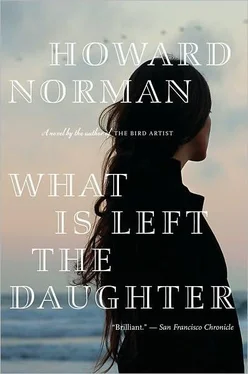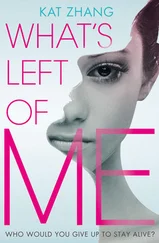Randall was well over six feet tall, lanky, with a generally bedraggled look and ill-fitting clothes. But he had a lively, alert face beneath his long black hair, parted straight down the middle, revealing a white furrow. He wore wire-rimmed spectacles. I could see into the storage room. There was a sink, a toothbrush in a water glass, pajamas hanging on the back of a chair. There must've been a mattress or cot back there, too. I thought Randall Webb must live in his store, or at least stayed there on occasion. Hans introduced Tilda and me.
"Tea?" Randall said.
All of us declined. Hans said, "Here's a list, Randall. I was hoping you might have these."
"Hans, my friend, let me read it." Randall studied the list, looked up and said, "Mostly you're in luck. Nix on the Schumann Piano Quartet in E-flat and the Piano Quintet in E-flat, though. By the way, that's got Schumann's three string quartets, all on the same recording. I haven't had one in stock for about a year. But there's a store in Montreal I do business with. I can try them. You pay for the long-distance call, I'll make inquiries."
"Let's just start with what you have in stock," Hans said.
Consulting the list, Randall moved through the aisles. A few students meandered in, browsed, chatted in French, but didn't make a purchase.
"How long have you had this shop?" I asked Randall, and he said, "Going on eight years."
Watching Randall scour the bins, I recalled Constance's "always leave a little room for a new purchase," and thought to send a postcard, even splurge on a telephone call or wire to Newfoundland, in which I'd recommend, if she still had room in her trunk, that she stop by Ballade & Fugue. She might find a gift for my uncle — and herself, of course.
The inventory of gramophone recordings was overwhelming. The bins held composition after composition I'd never heard, let alone knew existed — the shop seemed to be a crowded exhibit of my lack of musical knowledge. In fact, I pretty much knew only the works Donald had played every evening, and a few others from Classical Hour. Tilda shot me a disappointed, even embarrassed, look when I said, "Randall, can you tell me the name of the greatest composer born and raised in Nova Scotia and point out the right bin?"
Hans said, "That might take more research than Randall has time for just now, Wyatt."
That didn't help my confidence in the least. So it was a great kindness when Randall said, "Anything to do with classical music, I'm willing to find out. I admit I don't know such a composer, Wyatt. Professors in the music department come in here often, and one or two mention they've got talented students in composition, though they're mostly from Europe. I attend a student concert now and then, too. But to my knowledge, no Dalhousie student has gone on to make a reputation in the big wide world yet."
I was so grateful for his indulgence, I said, "Randall, would you pick out something for my aunt? She's already been up to her ears in Beethoven and Bach and Chopin. Maybe you can recommend something that will surprise her. Just make your best guess."
Randall seemed more than pleased. He walked to a bin against the far wall, took up an album and handed it to me. "This might work," he said.
Hans was curious and came right over and looked. "Selections from La Bohème, by Puccini," he said. "Tilda, does your mother enjoy opera?"
"For the life of me I don't know," Tilda said.
"Add this to my list, please, Randall," Hans said.
"No," I said. "Keep it separate. This is my gift to my aunt."
"Can you play it for us, Randall?" Tilda said.
Randall took the record from its sheath, carefully lifted the needle from the gramophone, then replaced one recording with the other. He set the needle down again, and as the overture began, he displayed the CLOSED sign on the front door, slid in the lock, lowered the door's shade and said, "It's a crime if La Bohème gets interrupted."
Randall brought out a chair from the storeroom. I sat on the chair, and Tilda and Hans sat on the frayed sofa, holding hands. "Did Puccini ever visit Canada?" I asked, nearly whispering to Randall as he walked past.
"I know for a fact he didn't," Randall said.
Ten minutes into it, I knew this music — and it didn't matter that I couldn't understand the words — wasn't going to allow small emotions. Tilda slid close to Hans and closed her eyes, a peaceful expression on her face. Randall lay down in an aisle, head resting on the stack of records he'd gathered from the list.
Hans changed records and sat back on the sofa with Tilda. Again they held hands. I looked over to the front window and saw three men, all in RCN uniforms, peering inside. I recognized one as the customer who'd been in Ballade & Fugue when Hans and Randall had greeted each other in German. Each Navy man had his eyes cupped and shaded by his hands, adjusting to the interior light of the store, probably wondering why the CLOSED sign was up. I'm certain they could hear La Boheme. One face disappeared, and I noticed the front door handle being tried. Randall, Hans and Tilda were lost to the opera. And right then and there I got a sick feeling, a bad feeling, but I made no logical connections, not like in a game of Criss Cross. I thought it had to do with the uniforms, the realization that I was officially in the RCN, that I might soon be out among German U-boats and every other horror. It could have been a thousand things. Then the three Navy men disappeared.
"Randall," I said, "that CLOSED sign turned away a few customers, I'm afraid."
"Look at it this way," Randall said. "What if they wanted to buy La Boheme right when we were listening to it? I only have the one set."
When the arias ended, Randall finished filling whatever of the list he had in stock. The money Hans had in his wallet fell a little short. I was going to offer some, but Randall said, "The rest we can work out in German lessons." He gift-wrapped the records individually and wrote out a receipt.
"We should be getting back home," I said.
"What on earth for?" Tilda said, and I had no good answer.
"Want to listen to more opera?" Randall said. "Once I put the sign up, I don't take it down till morning. My hours are my own." (I saw Hans jot down that phrase in a notebook.)
But we left Halifax shortly. The recordings were on the back seat. Once in Middle Economy, we went directly to the bakery, famished. It was already closed, so Tilda used the key Cornelia had given her. When we stepped inside, we found a note: A bit under the weather — there's half a cake on the counter. That cake with vanilla frosting was our dinner. I left the bakery at about nine P.M.
The next morning I was violently shaken awake. I squinted up at Uncle Donald, his unshaven face gaunt and derelict, breath like he'd been chewing sawdust. He was holding up the Halifax Mail. "See this, Wyatt!" he said loudly. "Right here on page two. Some Navy boys took direct action in Halifax last night." He tossed the newspaper onto my face and I heard him leave the room.
I went into the kitchen, ran cold water from the spigot and splashed some on my face, then sat with the Mail at the kitchen table. A headline on page two read: POLICE INVESTIGATE BREAK-IN; THREE RCN QUESTIONED. Underneath that: "Owner of Record Store in Serious Condition in Hospital."
Really, Marlais, I could scarcely believe my eyes. The article, which ran to two columns, informed readers that late the previous night thugs had broken into Ballade & Fugue, torn the place apart and "systematically splintered 1,789 gramophone recordings of classical music, according to owner Randall Webb's inventory." I knew it had to be those men who'd peered in through the window, the ringleader maybe the man who'd heard Hans and Randall speak German to each other. The rest of the article described how they'd attacked Randall in the storeroom, "rained blasphemies and indecencies on him, and had, in the course of a beating, broken his nose, cheekbone, and four ribs, punctured his spleen and left him with a severe concussion." It wasn't until four A.M. that Randall had managed to telephone the police, who immediately dispatched an ambulance. To my amazement, it was Officer Dhomnaill — I recognized his face in the photograph; he was standing in Randall's store — the newspaper quoted: "We jimmied open the door and found Mr. Webb unconscious and bleeding on the debris here in his shop."
Читать дальше












